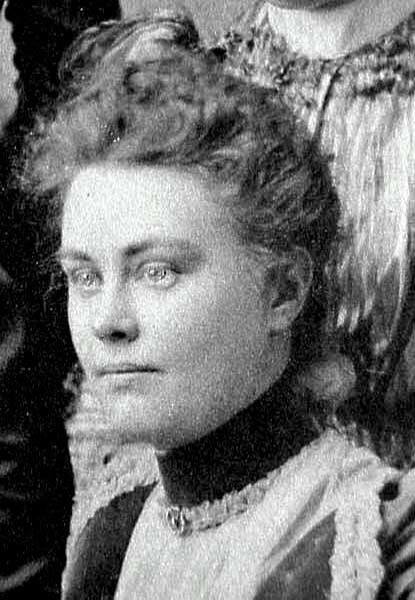Queer Places:
Lizzie Borden Bed and Breakfast Museum, 230 2nd St, Fall River, MA 02721
306 French St, Fall River, MA 02720
Oak Grove Cemetery, 765 Prospect St, Fall River, MA 02720
 Lizzie Andrew Borden[1]
(July 19, 1860 – June 1, 1927) was an American woman who is best known for
being the main suspect in the 1892 axe murders of her father and stepmother in
Fall River, Massachusetts. Borden was tried and acquitted of the murders.
Lizzie Andrew Borden[1]
(July 19, 1860 – June 1, 1927) was an American woman who is best known for
being the main suspect in the 1892 axe murders of her father and stepmother in
Fall River, Massachusetts. Borden was tried and acquitted of the murders.
The case was a cause célèbre throughout the United States. Following
her release from prison, where she was held during the trial, Lizzie chose to
remain a resident of Fall River despite facing ostracism from the other
residents. The Commonwealth of Massachusetts elected not to charge anyone else
with the murder of Andrew and Abby Borden, and speculation about the crimes
still continues more than 100 years later.
After the trial, the Borden sisters moved into a large, modern house in The
Hill neighborhood in Fall River. Around this time, Lizzie began using the name
Lizbeth A. Borden.[23][51]
At their new house, which Lizbeth dubbed "Maplecroft", they had a staff that
included live-in maids, a housekeeper, and a coachman. Because Abby was ruled
to have died before Andrew, her estate went first to Andrew and then, at his
death, passed to his daughters as part of his estate; a considerable
settlement, however, was paid to settle claims by Abby's family.[23][51]
Despite the acquittal, Lizbeth was ostracized by Fall River society.[47]
Her name was again brought into the public eye when she was accused of
shoplifting in 1897 in Providence, Rhode Island.[52]
In 1904, Nance O'Neil met
Lizzie Borden while in Boston. Apparently, Lizzie first made friends with
Ricca Allen, and through Ricca she arranged to meet Nance at a summer resort
near Lynn, Massachusetts in 1904. From there, Lizzie became a kind of groupie
to the O’Neil troupe. The two had a close friendship, which
incited considerable gossip.[5][6]
During O'Neil's two year stay in Boston, Lizzie paid her legal expenses in
several law suits; the reclusive Lizzie even accompanied O'Neil into the
courtroom for moral support. After one of the suits had been settled, Lizzie
rented a house in the resort town of Tyngsboro so that "she and Nance's
company could enjoy a week-long house party." Later, when O'Neil decided to
buy a summer home in Tyngsboro, Lizzie helped her with the down payment. After
one all-night party given for O'Neil and her company at Lizzie's home in Fall
River, Emma, Lizzie's sister, left the house and never spoke to Lizzie again.
It is unclear how or when the two women parted company, but by 1906 the bank
had foreclosed on O'Neil's Massachusetts home and no more money was
forthcoming from Lizzie.
Lizbeth was ill in her last year following the removal of her gallbladder;
she died of pneumonia on June 1, 1927, in Fall River. Funeral details were not
published and few attended.[54]
Nine days later, Emma died from chronic nephritis at the age of 76 in a
nursing home in Newmarket, New Hampshire[52][55]
having moved to this location in 1923 both for health reasons and to avoid
renewed publicity following the publication of another book about the murders.
The sisters, neither of whom had ever married, were buried side by side in the
family plot in Oak Grove Cemetery.[52]
Lizbeth left $30,000 to the Fall River
Animal Rescue League[56][57]
and $500 trust for perpetual care of her father's grave; her
closest friend and a cousin each received $6,000 —
substantial sums at the time of the estate's distribution in 1927.[6][58]
June Millington (born 1948),
Lizzie Borden (1860-1927) and
Susan B. Anthony (1820-1906),
all descend from the same Pilgrims, Samuel Eddy and Constant Mitchell.

Tony Scupham-Bilton -
Mayflower 400 Queer Bloodlines
My published books:


BACK TO HOME PAGE

- https://en.wikipedia.org/wiki/Lizzie_Borden
 Lizzie Andrew Borden[1]
(July 19, 1860 – June 1, 1927) was an American woman who is best known for
being the main suspect in the 1892 axe murders of her father and stepmother in
Fall River, Massachusetts. Borden was tried and acquitted of the murders.
Lizzie Andrew Borden[1]
(July 19, 1860 – June 1, 1927) was an American woman who is best known for
being the main suspect in the 1892 axe murders of her father and stepmother in
Fall River, Massachusetts. Borden was tried and acquitted of the murders.

